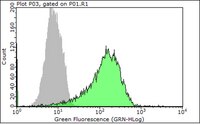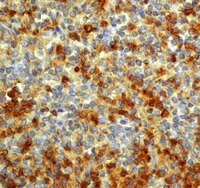Combinatorial fibronectin and laminin signaling promote highly efficient cardiac differentiation of human embryonic stem cells.
Sa, S; Wong, L; McCloskey, KE
BioResearch open access
3
150-61
2014
Show Abstract
Cardiomyocytes (CMs) differentiated from human embryonic stem cells (hESCs) are a promising and potentially unlimited cell source for myocardial repair and regeneration. Recently, multiple methodologies-primarily based on the optimization of growth factors-have been described for efficient cardiac differentiation of hESCs. However, the role of extracellular matrix (ECM) signaling in CM differentiation has not yet been explored fully. This study examined the role of ECM signaling in the efficient generation of CMs from both H7 and H9 ESCs. The hESCs were differentiated on ECM substrates composed of a range of fibronectin (FN) and laminin (LN) ratios and gelatin and evaluated by the fluorescence activated cell scanning (FACS) analysis on day 14. Of the ECM substrates examined, the 70:30 FN:LN reproducibly generated the greatest numbers of CMs from both hESC lines. Moreover, the LN receptor integrin β4 (ITGB4) and FN receptor integrin β5 (ITGB5) genes, jointly with increased phosphorylated focal adhension kinase and phosphorylated extracellular signal-regulated kinases (p-ERKs), were up-regulated over 13-fold in H7 and H9 cultured on 70:30 FN:LN compared with gelatin. Blocking studies confirmed the role of all these molecules in CM specification, suggesting that the 70:30 FN:LN ECM promotes highly efficient differentiation of CMs through the integrin-mediated MEK/ERK signaling pathway. Lastly, the data suggest that FN:LN-induced signaling utilizes direct cell-to-cell signaling from distinct ITGB4(+) and ITGB5(+) cells. | Fluorescence Activated Cell Sorting (FACS) | 25126479
 |
IκB kinase complex (IKK) triggers detachment-induced autophagy in mammary epithelial cells independently of the PI3K-AKT-MTORC1 pathway.
Chen, N; Debnath, J
Autophagy
9
1214-27
2013
Show Abstract
Adherent cells require proper integrin-mediated extracellular matrix (ECM) engagement for growth and survival; normal cells deprived of proper ECM contact undergo anoikis. At the same time, autophagy is induced as a survival pathway in both fibroblasts and epithelial cells upon ECM detachment. Here, we further define the intracellular signals that mediate detachment-induced autophagy and uncover an important role for the IκB kinase (IKK) complex in the induction of autophagy in mammary epithelial cells (MECs) deprived of ECM contact. Whereas the PI3K-AKT-MTORC1 pathway activation potently inhibits autophagy in ECM-detached fibroblasts, enforced activation of this pathway is not sufficient to suppress detachment-induced autophagy in MECs. Instead, inhibition of IKK, as well as its upstream regulator, MAP3K7/TAK1, significantly attenuates detachment-induced autophagy in MECs. Furthermore, function-blocking experiments corroborate that both IKK activation and autophagy induction result from decreased ITGA3-ITGB1 (α3β1 integrin) function. Finally, we demonstrate that pharmacological IKK inhibition enhances anoikis and accelerates luminal apoptosis during acinar morphogenesis in three-dimensional culture. Based on these results, we propose that the IKK complex functions as a key mediator of detachment-induced autophagy and anoikis resistance in epithelial cells. | | 23778976
 |
Integrins as antimetastatic targets of RGD-independent snake venom components in liver metastasis [corrected].
Rosenow, F; Ossig, R; Thormeyer, D; Gasmann, P; Schlüter, K; Brunner, G; Haier, J; Eble, JA
Neoplasia (New York, N.Y.)
10
168-76
2008
Show Abstract
Metastasis comprises several subsequent steps including local invasion and intravasation at the primary site, then their adhesion/arrest within the vessels of host organs followed by their extravasation and infiltration into the target organ stroma. In contrast to previous studies which have used aspartate-glycine-arginine (RGD) peptides and antibodies against integrins, we used rare collagen- and laminin-antagonizing integrin inhibitors from snake venoms to analyze the colonization of the liver by tumor cells both by intravital microscopy and in vitro. Adhesion of liver-targeting tumor cells to the sinusoid wall components, laminin-1 and fibronectin, is essential for liver metastasis. This step is inhibited by lebein-1, but not by lebein-2 or rhodocetin. Both lebeins from the Vipera lebetina venom block integrin interactions with laminins in an RGD-independent manner. Rhodocetin is an antagonist of alpha2beta1 integrin, a collagen receptor on many tumor cells. Subsequent to tumor cell arrest, extravasation into the liver stroma and micrometastasis are efficiently delayed by rhodocetin. This underlines the importance of alpha2beta1 integrin interaction with the reticular collagen I-rich fibers in liver stroma. Antagonists of laminin- and collagen-binding integrins could be valuable tools to individually block the direct interactions of tumor cells with distinct matrix components of the Disse space, thereby reducing liver metastasis. Full Text Article | | 18283339
 |
Integrin regulation by vascular endothelial growth factor in human brain microvascular endothelial cells: role of alpha6beta1 integrin in angiogenesis.
Lee, TH; Seng, S; Li, H; Kennel, SJ; Avraham, HK; Avraham, S
The Journal of biological chemistry
281
40450-60
2006
Show Abstract
The precise role of vascular endothelial growth factor (VEGF) in regulating integrins in brain microvascular endothelial cells is unknown. Here, we analyzed VEGF effects on integrin expression and activation in human brain microvascular endothelial cells (HBMECs). Using human cDNA arrays and ribonuclease (RNase) protection assays, we observed that VEGF up-regulated the mRNA expression of alpha(6) integrin in HBMECs. VEGF significantly increased alpha(6)beta(1) integrin expression, but not alpha(6)beta(4) integrin expression in these cells. Specific down-regulation of alpha(6) integrin expression by small interfering RNA (siRNA) oligonucleotides inhibited both the capillary morphogenesis of HBMECs and their adhesion and migration. Additionally, VEGF treatment resulted in activation of alpha(6)beta(1) integrins in HBMECs. Functional blocking of alpha(6) integrin with its specific antibody inhibited the VEGF-induced adhesion and migration as well as in vivo angiogenesis, and markedly suppressed tumor angiogenesis and breast carcinoma growth in vivo. Thus, VEGF can modulate angiogenesis via increased expression and activation of alpha(6)beta(1) integrins, which may promote VEGF-driven tumor angiogenesis in vivo. | | 17085437
 |















